
Alexandre Zelkine: Russian soul in 11 tongues
/ Главная / Russkiy Mir Foundation / Publications / Alexandre Zelkine: Russian soul in 11 tonguesAlexandre Zelkine: Russian soul in 11 tongues
Anna Genova
Last year has brought another great loss: Alexandre Zelkine has passed away on December, 4. He was 84 years old. We have decided to republish our last conversation with this outstanding person, who brought Russian culture and Russian songs around the world.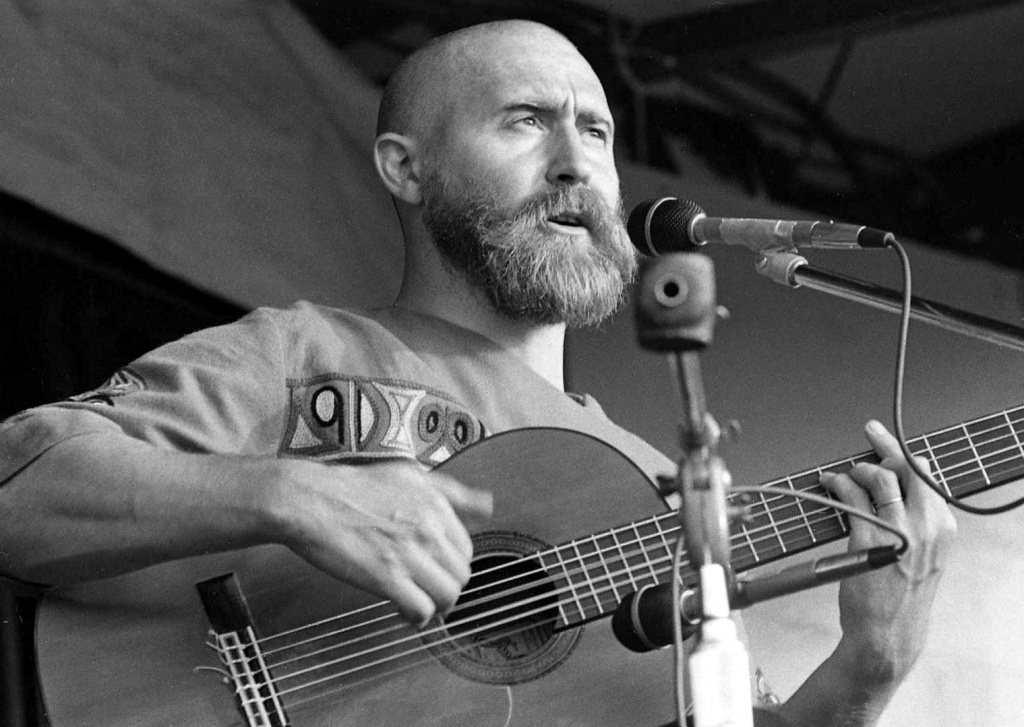
Mariposa Folk Festival - Toronto 1970
Nowadays not many people know the name of Alexandre Zelkine (or Alexander Zelkin in Russian version) a singer of Russian, Gypsy, French songs and romances. His noble baritone won listeners in the USA and Canada, France, Israel and many other countries in the 1960-1980s. One of the most famous of his LP records was Russian Folk Songs with interpretations of Bublichki (Bagels), Chubchik Kucheryavy (Curly Forelocky), Song of an Old Cabby, Podmoskovnye Vechera (Moscow Nights) which perhaps can only be compared with the ones of Alexander’s great predecessors, such as Misha Epelbaum, Leonid Utesov or Alyosha Dimitrievich.
A son of a Russian emigrant and a Frenchwoman was born in Lyon and lived his whole life away from Russia. At the same time, Zelkine sings in perfect Russian, and his singing is absolutely charming. Today, Alexander Vladimirovich lives with his wife in the French city of Le Mans. He agreed to tell us about his life and such cultural phenomenon as the Russian soul.
– Alexander Vladimirovich, I first heard you on YouTube. It was an episode of the Rainbow Quest, an American folk music program hosted by Peter Seeger in the early 1960s. It was a popular show where Seeger invited various young performers, including Johnny Cash and Bob Dylan. You performed many songs there - in Russian, French, Bulgarian, and even in Hebrew. Tell us about that record.
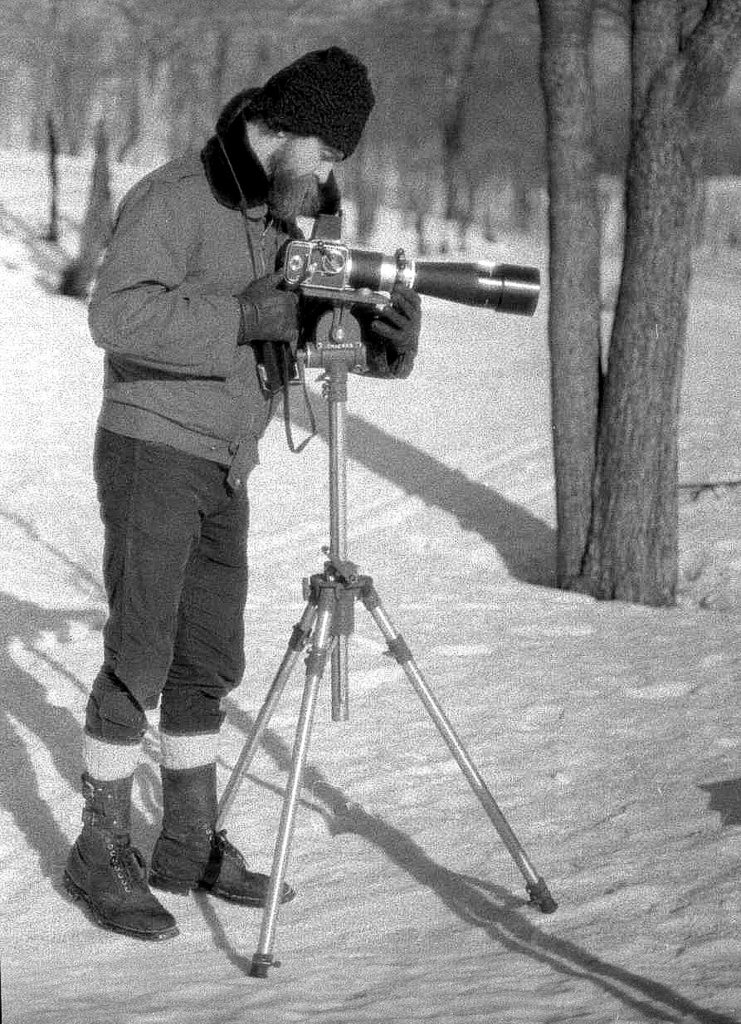
– It happened shortly after the release of my first LP record, Russian Folk Songs, which I recorded in New York. Soon I left the Big Apple for Montreal, where new opportunities opened up for me. I was introduced to Pete Seeger by Martha Schlamme, our mutual friend and a singer. I will be grateful to her forever for it - my performance in that program was very successful. I have the warmest and most charming memories of it.
– I was overwhelmed by your performance of “Vdol’ Da Po Rechke” (Along the River). You know that this song has so many interpretations by classical and restaurant performers, and, of course, Russian folk choirs. Did you listen to someone specific, did you have idols at that time?
– I discovered this song many years ago in a collection of Russian songs. And I heard only one record. I don’t remember, some (Soviet) choir performed it ... maybe Pyatnitsky?
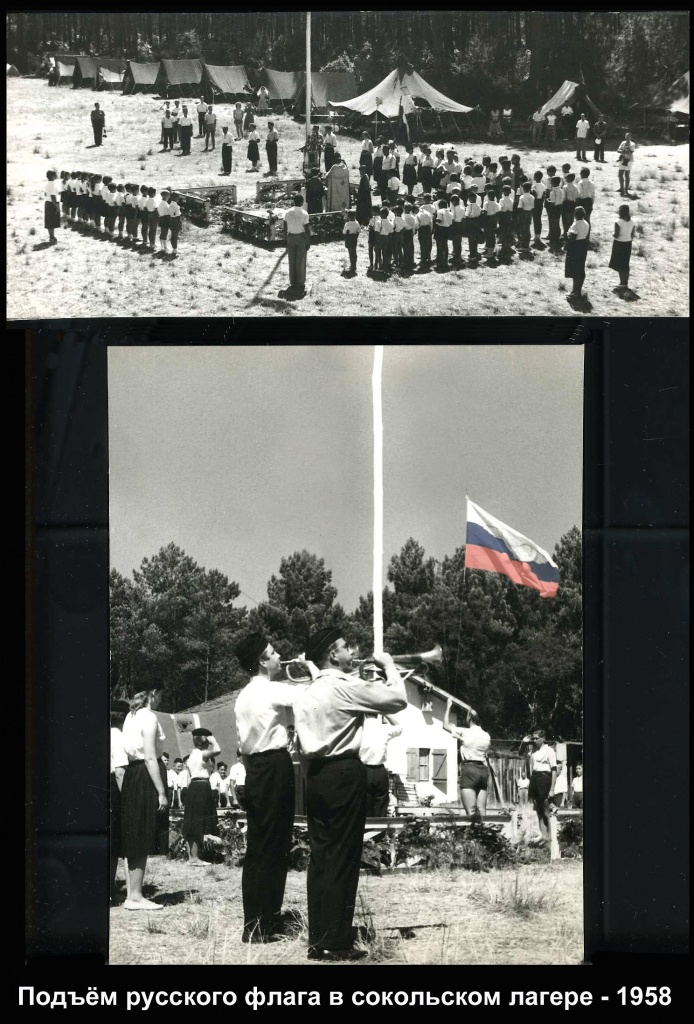
On the ocean coast in Sokolsky camp, 1958
– At the beginning of that program, you perform an instrumental interpretation of Svetit Mesyats (The Moon Shines) together with Peter and share that you remembered this song in your childhood when you spent holidays in a Russian summer camp in France. In my understanding it was in the late 1940s, wasn’t it? What was that camp about?
– Yes, exactly, this story dates back to the period from the late 1940s to the early 1950s. That time I lived in the country town of Lyon, so there were very few opportunities for me to meet Russian-speaking peers. And those camps – at first the Paris Scouts on the oceanfront, then the Sokolsky on Lake Geneva – were the places where I finally was surrounded by Russian environment, Russian culture. I enthusiastically absorbed everything related to Russian language
– You were born in 1938 to a Russian father and a French mother. How did it happen that they met? Did your father leave Russia or his parents did ?
– My old man was born in the city of Oryol and got education at the Moscow Military Academy. Then, having become a young officer, he was transferred to Baku, where he received flight operation training in the naval forces of the Imperial Army. From the very beginning of the Civil War, he was assigned to a shock regiment of the legendary General Kornilov. However, at the end of 1920, after defeat of the Army of Wrangel, he was evacuated to Gallipoli, Turkey, and then, several months later, to Bulgaria, where he lived for seven years in abject poverty.
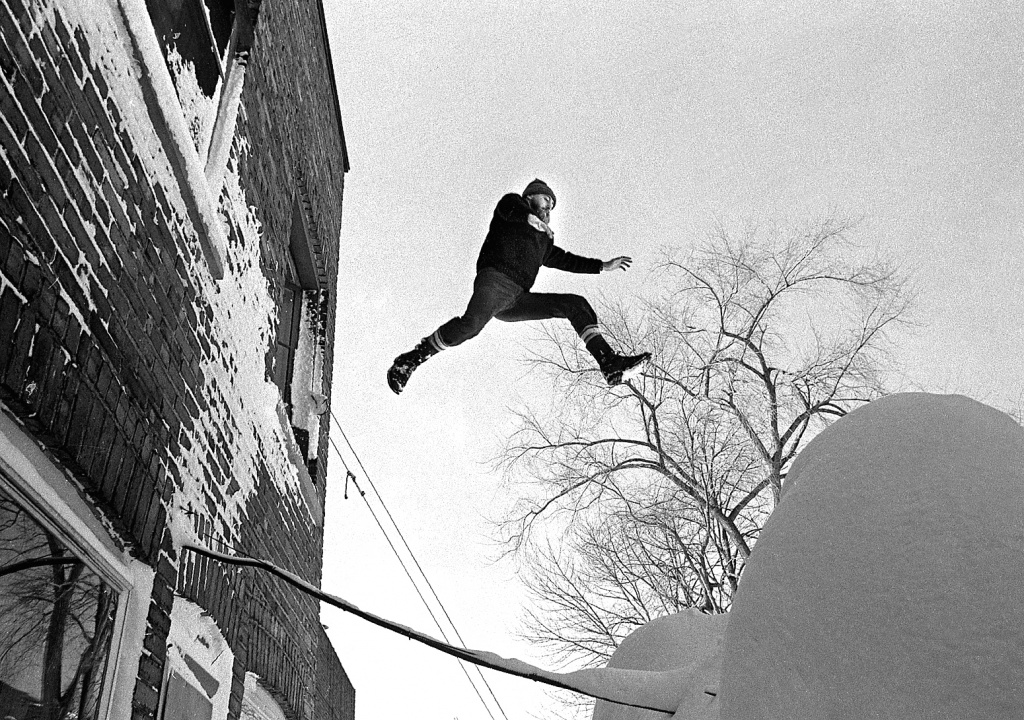
Meanwhile, his mother (my grandmother), was a widow of an aristocrat of Baltic descent. She left the USSR, leaving part of her family there, and settled in Lyon, where my father finally managed to join her in 1928. Since his Russian degrees were not of use in France, he had to pass all exams again. He temporarily got a job as a simple labourer at an artificial textile factory. There he met my mother, who worked as a chemical engineer.
– You lived in a bilingual environment, but eventually mastered seven languages, and sang on 14 or even more... How did this happen?
– You probably know that Russians are famous for their very good knowledge of foreign languages. As for me, I spoke nine languages (more or less fluently). But, unfortunately, due to the lack of practice, I have completely forgotten most of them by now...
– Alas, not all Russians have propensity for languages. But we surely make effort to study them! Alexander Vladimirovich, let us talk about your professional identity: you studied music at the conservatory, but then gave up the idea of opera stage and became entirely taken up with what we now call “Chanson”, “Folk” - what was the reason for that?
– It was due to the following fact: it suddenly became obvious to me that a huge part so-called opera lovers consisted mainly of snobs who did not know a damn thing about music, needless to say about lyrical art. On the other hand, I always loved music of different countries, which I really liked to perform.
Rainbow Quest program with Peter Seeger
– In 1965 you released an amazing Russian Folk Songs LP, mentioned before. You sang hits, which included folk and also author songs, such as Katyusha, Chubchik Kucheryavy, and Bublichki. Then in the 1970s, Meadowland album was released, which included some Soviet songs as well (for example, Nikita Bogoslovsky’s Beloved City. How did you choose your repertoire?
– I mostly did it by listening to new (for me) songs recorded by various performers of that time, such as Sarah Gorbi, Pyotr Leshchenko, Misha Epelbaum, Alyosha Dimitrievich, and etc. And my father then helped me rewrite the words. Such was the case, for instance, with the Oh, Roads song performed by Mark Reisen in such a sentimental way. And I personally recorded it - with the orchestra - many years later.
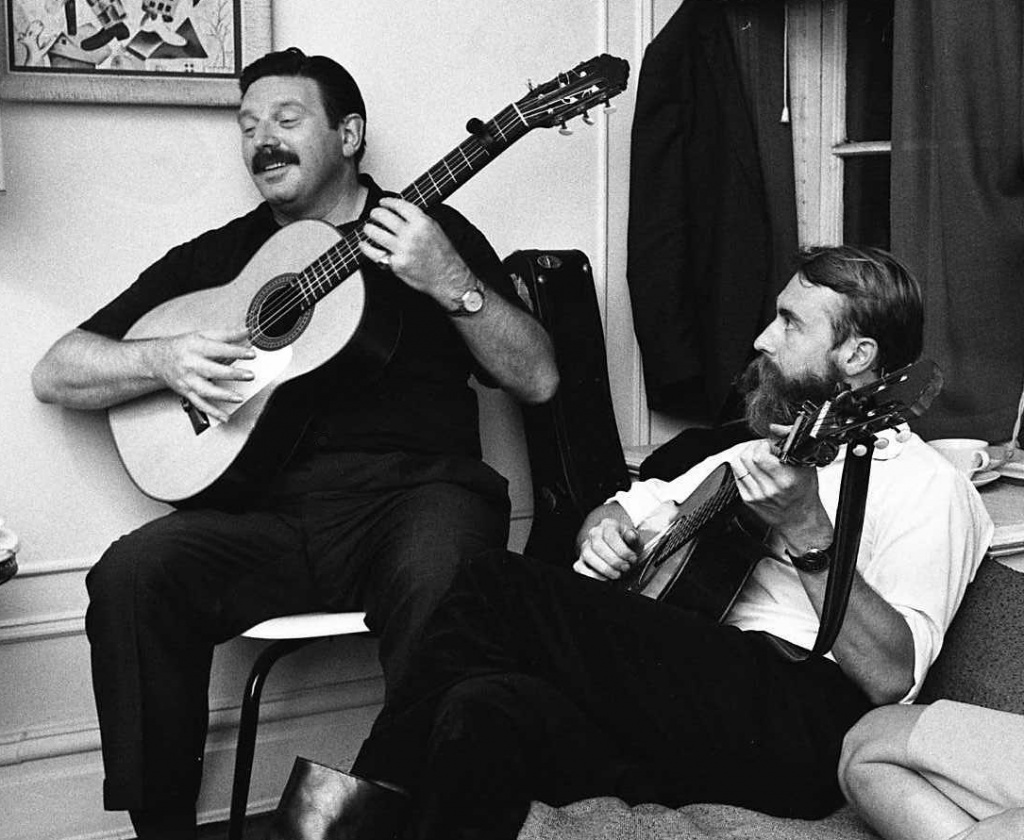
With Theodore Bickel, New York, 1965
– How did your stage career develop further on?
– While being a student of the conservatory, I sang semi-professionally in France, in the Los Chacos trio. Then in Israel, where I lived and worked as a special photo reporter. Photography is still the natural passion of my life.
In 1964, having returned from Israel, for almost a whole season I performed in a Parisian Russian restaurant and in several other places in the Latin Quarter. Then I immigrated to the USA. A few days after arriving to New York, I was hired by the Petrushka Russian Restaurant, where I recorded my first LP out of seven. Moreover, I became friends with Theodore Bickel, a famous actor and singer, and in the following years I several times performed together with him on the stage, on radio and television, both in the USA and in Canada.
After New York, I left for Canada in 1966, where I also achieved great success. And that success lasted — with its ups and downs — for nearly 20 years.
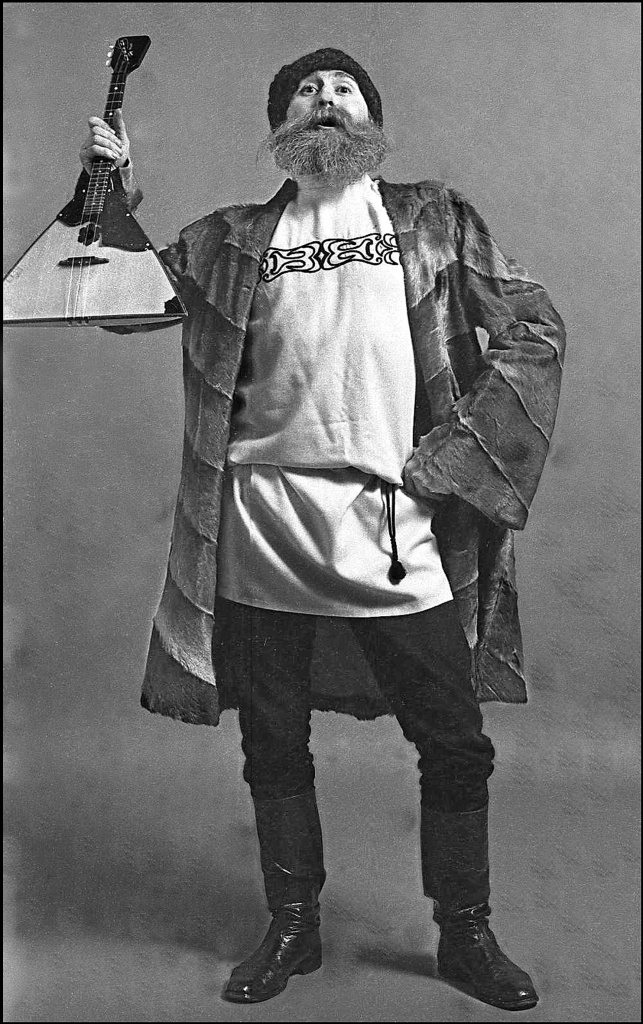
– When did you stop singing?
– When the audience finally got thorough with such kind of music; nevertheless, I said everything I could in this realm... After that I continued to sing for my personal pleasure and for friends, until I became around 62. Since that time my hearing was getting worse, and as a result I began to sing out of tune... My hearing has been gone to such an extent that now I am not even able to tune my guitar anymore... I think that loss of hearing is a consequence of my participation in the Algerian war where I worked as an expert in explosives and shooting instructor for two years. Just imagine, after almost a whole day of training, for example, with a heavy-caliber machine gun, I felt pretty... damped. Unfortunately, this conditioned has worsened over the years.
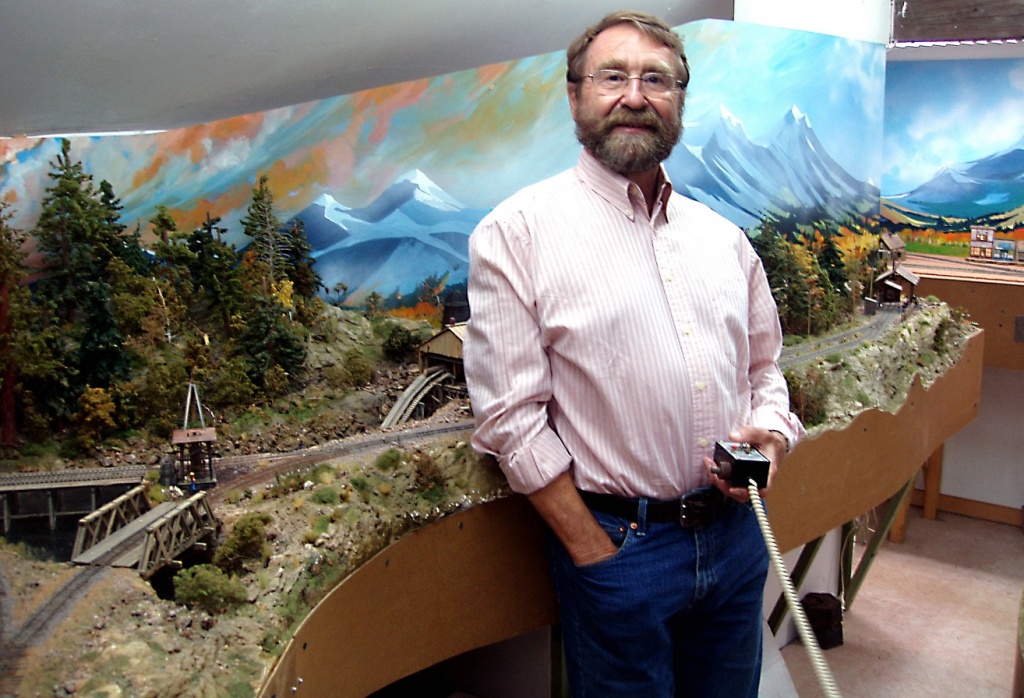
Alexandre Zelkine next to his own model railway
– As a well-rounded personality, you have become enthusiastic about absolutely different type of activity - modelling of railways...
– I have not become an expert in this area, although I have published many articles. One even appeared in Lokotrans, a Russian magazine, in 2006. Four years ago, The Degulbeef & Cradding Railroad, a book dedicated to the same topic, was published in French and English.
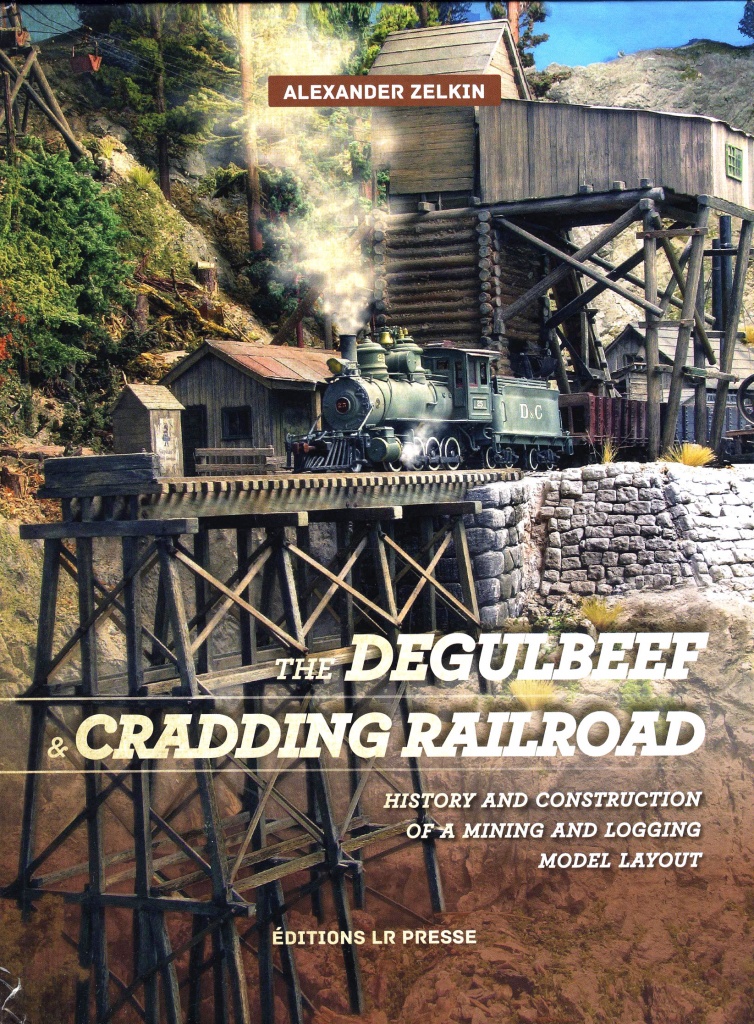
– Alexander Vladimirovich, what famous characters of Russian emigration abroad did you happen to communicate with?
– To be honest, I did not meet many of them. In addition to names mentioned above, Alyosha and Valya Dimitrievich, famous gypsies, were among those who made a strong impression and impact on me. Actually, there were a whole tribe of them: Valya and Alyosha, and even Sonya and Lyalya. I once performed with then in Petruska Restaurant in New York.
Besides them, the only celebrity - and not least - was Prince Yusupov, Rasputin’s killer, who once came to a restaurant in Paris, where I performed in 1964.
– In 1995, you were granted Russian citizenship by a decree of Boris Yeltsin. Tell us more about how it happened.
– In 1994, I read an article in the Moscow News that the Russian government intended to return Russian citizenship to all those who lost it after they had been expelled from Russia in 1917, or to their children. Since I fully fell into this category and had all the supporting documents, I filed a petition. A few months later, President Yeltsin put his signature in favour of my naturalization. Therefore, I can now be proud of triple citizenship, that is, French, Canadian and Russian. But let me be frank: a Canadian passport is still the most convenient one if you want to travel around the world without any issues.
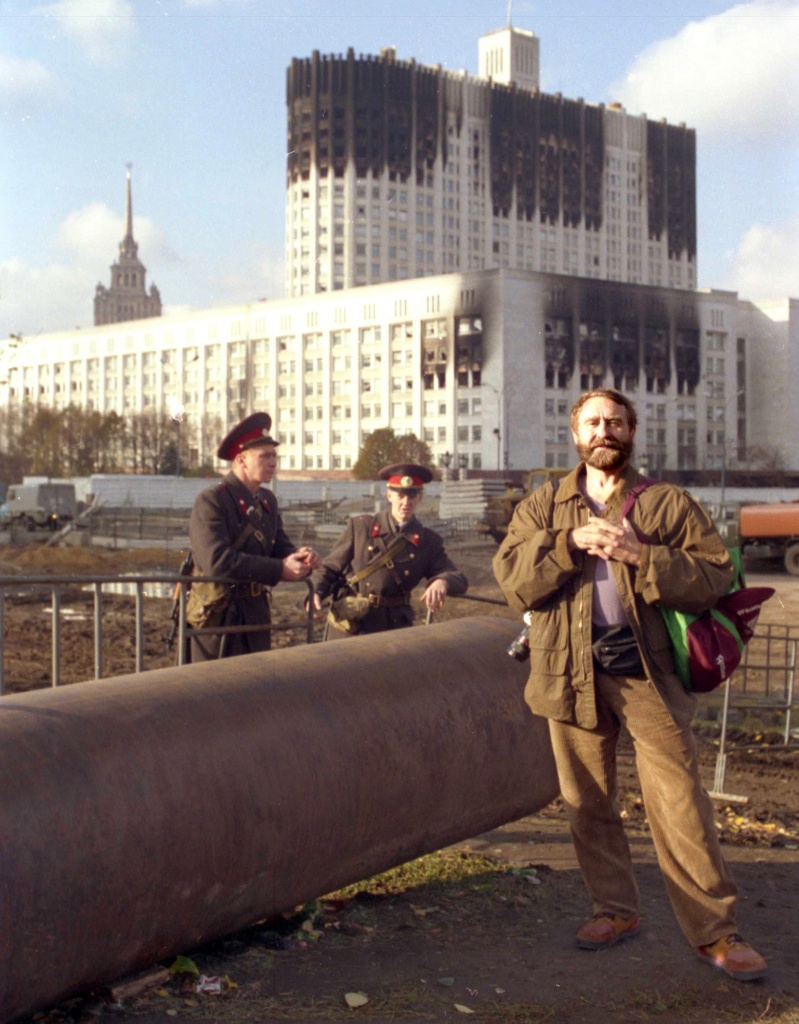
Next to the Russian White House, Moscow, October 1993
– You first came to Russia in 1993. It was quite a challenging time for the country...
– Yes. That fall I witnessed the uprising next to the Russian White House.
- What did you expect and what did you see? What were the most striking moments of your stay and work during those years? You did not come as a tourist, but as a guide-interpreter, didn’t you?
– Yes, you are right. What I saw (and expected, more or less) was absolutely not as intense as what I felt! Everywhere I went, I felt embraced by people of my own, as if I had spent my whole life among them, both in better and worse times. And the most striking episode of my stay was my reunion with relatives in Moscow. And I also took decision: I will never travel with these stupid tourists again!
– Have you come to Russia since then?
– Unfortunately, I have never again had the opportunity to return to Russia.
– Alexander Vladimirovich, do children and grandchildren speak Russian in your family?
– My daughter Lyudmila, who lives with her two children in Florida, and who is much more talented in foreign languages than me, speaks a little Russian. My grandson Vladimir and his sister Coralie do not speak Russian at all. But they have a red cat, whose name is Morkovka (Carrot).
New publications

 Mikhail Kalatozov, a director who transformed the world of cinematography in many ways, was born 120 years ago. He was a Soviet film official and a propagandist. Above all, he was capable of producing movies that struck viewers with their power and poetic language.
Mikhail Kalatozov, a director who transformed the world of cinematography in many ways, was born 120 years ago. He was a Soviet film official and a propagandist. Above all, he was capable of producing movies that struck viewers with their power and poetic language.  Ukrainian authorities have launched a persecution campaign against the canonical Ukrainian Orthodox Church (UOC), the biggest one in the country's modern history. Over the past year, state sanctions were imposed on clergy representatives, searches were conducted in churches, clergymen were arrested, criminal cases were initiated, the activity of the UOC was banned in various regions of the country, and monasteries and churches were seized.
Ukrainian authorities have launched a persecution campaign against the canonical Ukrainian Orthodox Church (UOC), the biggest one in the country's modern history. Over the past year, state sanctions were imposed on clergy representatives, searches were conducted in churches, clergymen were arrested, criminal cases were initiated, the activity of the UOC was banned in various regions of the country, and monasteries and churches were seized.  When Nektary Kotlyaroff, a fourth-generation Russian Australian and founder of the Russian Orthodox Choir in Sydney, first visited Russia, the first person he spoke to was a cab driver at the airport. Having heard that Nektariy's ancestors left Russia more than 100 years ago, the driver was astonished, "How come you haven't forgotten the Russian language?" Nektary Kotlyaroff repeated his answer in an interview with the Russkiy Mir. His affinity to the Orthodox Church (many of his ancestors and relatives were priests) and the traditions of a large Russian family brought from Russia helped him to preserve the Russian language.
When Nektary Kotlyaroff, a fourth-generation Russian Australian and founder of the Russian Orthodox Choir in Sydney, first visited Russia, the first person he spoke to was a cab driver at the airport. Having heard that Nektariy's ancestors left Russia more than 100 years ago, the driver was astonished, "How come you haven't forgotten the Russian language?" Nektary Kotlyaroff repeated his answer in an interview with the Russkiy Mir. His affinity to the Orthodox Church (many of his ancestors and relatives were priests) and the traditions of a large Russian family brought from Russia helped him to preserve the Russian language.

 The leaders of the Friends of the Great Russia cultural association (Amici Della Grande Russia) in Italy believe that the Western policy of abolishing Russian culture in Europe has finally failed. Furthermore, it was doomed to failure from the beginning.
The leaders of the Friends of the Great Russia cultural association (Amici Della Grande Russia) in Italy believe that the Western policy of abolishing Russian culture in Europe has finally failed. Furthermore, it was doomed to failure from the beginning.  Name of Vladimir Nemirovich-Danchenko is inscribed in the history of Russian theater along with Konstantin Stanislavski, the other founding father of the Moscow Art Theater. Nevertheless, Mr. Nemirovich-Danchenko was a renowned writer, playwright, and theater teacher even before their famous meeting in the Slavic Bazaar restaurant. Furthermore, it was Mr. Nemirovich-Danchenko who came up with the idea of establishing a new "people's" theater believing that the theater could become a "department of public education."
Name of Vladimir Nemirovich-Danchenko is inscribed in the history of Russian theater along with Konstantin Stanislavski, the other founding father of the Moscow Art Theater. Nevertheless, Mr. Nemirovich-Danchenko was a renowned writer, playwright, and theater teacher even before their famous meeting in the Slavic Bazaar restaurant. Furthermore, it was Mr. Nemirovich-Danchenko who came up with the idea of establishing a new "people's" theater believing that the theater could become a "department of public education."  "Russia is a thing of which the intellect cannot conceive..." by Fyodor Tyutchev are famous among Russians at least. December marks the 220th anniversary of the poet's birth. Yet, he never considered poetry to be his life's mission and was preoccupied with matters of a global scale. Mr.Tyutchev fought his war focusing on relations between Russia and the West, the origins of mutual misunderstanding, and the origins of Russophobia. When you read his works today, it feels as though he saw things coming in a crystal ball...
"Russia is a thing of which the intellect cannot conceive..." by Fyodor Tyutchev are famous among Russians at least. December marks the 220th anniversary of the poet's birth. Yet, he never considered poetry to be his life's mission and was preoccupied with matters of a global scale. Mr.Tyutchev fought his war focusing on relations between Russia and the West, the origins of mutual misunderstanding, and the origins of Russophobia. When you read his works today, it feels as though he saw things coming in a crystal ball...